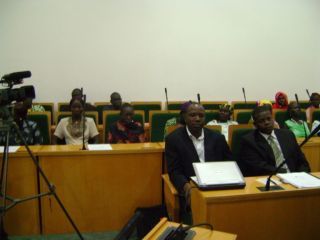Reducing maternal, infant mortality rates a key priority-GOSS
By Julius N. Uma
May 24, 2010 (JUBA)-Southern Sudan may not have been a direct signatory to the 2015 Millennium Development Goals (MDGs), but efforts to reduce maternal and infant mortality rate remains government’s key priority, a senior heath official has revealed.

Dr. Olivia Lomoro, the Acting under Secretary in the Ministry of Health made these remarks while officially opening a two-day workshop on human resources for maternal and neonatal survival in Juba, South Sudan yesterday.
Already, the Government of Southern Sudan (GoSS) has, through its Health Ministry, developed a Maternal and Reproductive Health Policy and Strategy, aimed at addressing the high rates of maternal and infant mortality in the semi-autonomous region.
“GoSS [Government of Southern Sudan] has developed a Maternal and Reproductive Health Policy and Strategy and considers reproductive health issues as its top priority area of focus for immediate redress,” the Acting Health Under Secretary said.
The Health Ministry, according to Dr. Olivia, is in the process of developing a strategic health plan and appealed to other development partners to support government in its efforts to reduce South Sudan’s maternal and infant mortality rates.
In related development, United Nations Population Fund (UNFPA) Deputy Representative UNFPA in Southern Sudan, Dr. Dragudi Buwa acknowledged government’s commitment towards addressing reproductive health issues, notable through its investment in mid-level cadres of trained health staffs.
According to Dr. Buwa, UNFPA and the UN Country Team (UNCT) consider the high maternal and infant mortality rates as key priorities that call for immediate intervention.
“The UNCT [United Nations Country Team] will support GoSS efforts to reduce maternal mortality in Southern Sudan,” Dr. Buwa said.
Meanwhile participants attending the two-day workshop are expected to reach a consensus on the use of task-shifting strategy, hence agree to train non-physician clinicians (NPCs) in emergency obstetric care for the reduction of maternal and neonatal mortality in Southern Sudan
The two-day event, which is being organized by the Ministry of Health (GoSS) and development partners such as UNFPA, WHO, World Bank, African Union and Karolinska Institute, among others, brought together development partners’ community, researchers and technical experts on maternal health including officials from the Ministry of Health (GoSS) and States, Clinical training institutions in Southern Sudan as well as resource-persons from Ethiopia, Malawi, Tanzania, Zambia and the Karolinska Institute of Sweden.
WORRYING HEALTH TRENDS
To-date, the health sector in Southern Sudan remains extremely weak, characterized by sub-standard quality of services, limited coverage of health facilities vis-à-vis population size, unequal distribution and in some remote areas; there are absolutely no health facilities.
Currently, however, global statistics indicate that over 80 percent of maternal deaths are directly related to obstetric fistula, haemorrhage, obstructed labour, eclampsia and unsafe abortions. Existing conditions such as malaria, HIV/AIDS, hepatitis, anaemia and micronutrient deficiencies indirectly account for the other 20 percent.
However, the degree to which each of these influences maternal deaths in South Sudan is reportedly still unknown. Risks to maternal health in South Sudan include early marriages; close spacing of children due to the pressure to replace family members lost due to conflict, and heavy workloads during pregnancy.
High incidences of miscarriages reported in Narus and New Cush in Eastern Equatoria were attributed to strenuous daily chores. These risks are compounded by an inadequate health delivery system.
According to the 2004 Interim MDG Report on South Sudan, the limited studies available estimate that maternal mortality ratio (MMR) ranges from 400 to 800 per 100,000 live births.
However, further notes the report, it is likely that MMR is on the higher side, given the virtual absence of emergency obstetric care, a high fertility rate of 6.787, and the fact that the women start bearing children at a very young age. Hence, an estimate of 1700 per 100,000 live births presents a more accurate picture. Skilled delivery care is severely limited in South Sudan.
In 2000, for instance, skilled health personnel reportedly attended to only five percent of births (traditional birth attendants are not considered skilled birth attendants). There are no training schools for midwives and the breakdown of the education system during the war means that not only is there a shortage of trained personnel, but candidates for training are also limited.
(ST)

Lello
Reducing maternal, infant mortality rates a key priority-GOSS
Do you just put infant mortality rates as a key priority after five years. The GOSS is suck, how do you do that before you get rid of plague corruption that try to swallowing Southern Sudan resources?
Lello Ngum